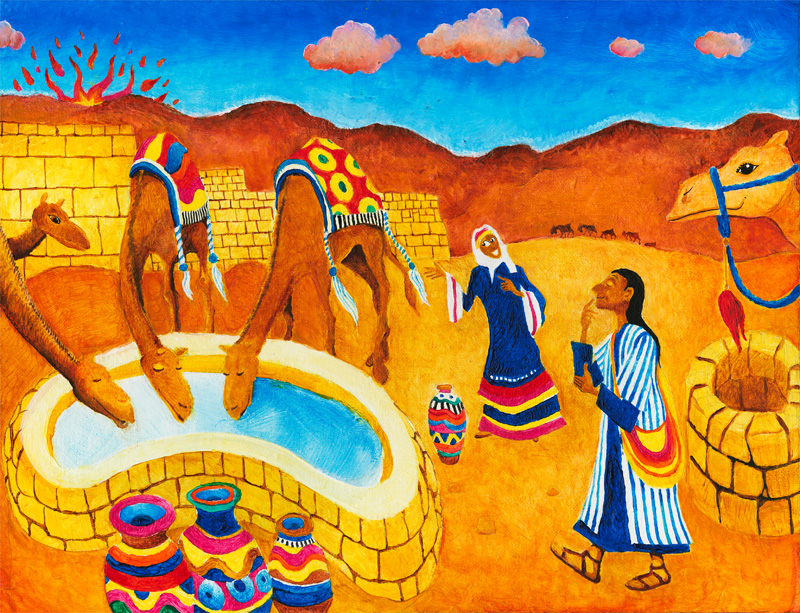Bonjour / Hello [nickname_else_first_name],
Table of contents
1) Perashat Hashavoua - Rabbi Eli Mansour
2) Halakhat Hashavoua (Halakhot related to day to day life) - Hazzan David Azerad
- Birkot Hashachar (Peninei Halacha)
3) Holy Jokes!
4) FOR KIDS!

This Week's Parasha Insight with Rabbi Eli Mansour
Parashat Hayeh-Sara- Heavenly Matches
Parashat Hayeh-Sara tells the story of Eliezer, Abraham Abinu’s trusted servant whom Abraham sent to find a wife for Yishak. Abraham made Eliezer take an oath that he would not bring for Yishak a woman from the local population, and would instead find a wife from Abraham’s homeland. In imposing this oath upon Eliezer, Abraham said, "I will make you swear by Hashem, G-d of the heavens and G-d of the earth" (24:3).
Rabbi Abraham Ibn Ezra (Spain, 1089-1167) explains why Abraham emphasized in this context that Hashem is "G-d of the heavens and G-d of the earth." He writes: "Because [the designation] of the daughter of so-and-so for so-and-so on earth is from the heavens." The matches that are made here on earth are decided up in the heavens, and so as Abraham sends his servant to find a spouse for his son, Yishak, he speaks of Hashem as "G-d of the heavens and G-d of the earth," emphasizing that the matches on earth originate in the heavens. Ibn Ezra concludes, "Ve’hu Sod" – "This is a secret," indicating that this interpretation touches upon profound Kabbalistic teaching.
Later commentators uncovered for us the deep concepts underlying Ibn Ezra’s remark. The Gemara in the beginning of Masechet Sota teaches that even before a fetus is formed, a heavenly voice declares whom that person is going to marry. However, the Gemara adds, this refers only to "Zivug Rishon" – "the first marriage." When it comes to "Zivug Sheni" – a person’s second marriage, this is not predetermined, and who a person marries the second time depends on his or her deeds. On the surface, the Gemara here speaks of people who marry more than once, due to the death of their spouse or divorce. The Kabbalists, however, explain this Gemara differently. They explain that a husband and wife’s souls were created together, bound into a single entity. Just as the Sages teach that Adam and Hava were created as a single body, and were then separated, similarly, a husband and wife’s souls began as a single soul in the heavens. They were then separated and sent down to the earth as two different beings, and so when a man and woman marry, their souls reunite and again become bound into the single soul that they had initially comprised. The Gemara thus teaches that the "Zivug Rishon" – the initial bond between a husband and wife, which existed in the heavens before they were born, is predetermined by G-d, and has nothing to do with their actions and their merits. But the "Zivug Sheni" – the reuniting of the two souls in this world through marriage, is not predetermined, and needs to be earned. Indeed, as we know, in order to find a spouse, one must develop his character, be responsible and prepare himself to build a close relationship and care for a family. The original bond between the two souls happens without any effort, but the "Zivug Sheni" here on earth requires a great deal of hard work.
On this basis, the Kabbalists explained the Gemara’s famous comment that making a match is "as difficult as the splitting of the Yam Suf." At first glance, the splitting of the sea – which involved separating water, which is naturally together – seems hardly an appropriate analogy for matchmaking, which involves the precise opposite process, bringing two different, distinct individuals together. In light of what we have seen, however, to the contrary – the splitting of the sea is the perfect analogy for matchmaking. The waters of the sea split to allow Beneh Yisrael to safely cross, and then came back together. The same is true of a husband and wife – the two souls begin bound together in the heavens, but are at one point separated, and reunited again through marriage.
This, then, is the deeper meaning of the Ibn Ezra’s remark: "Because [the designation] of the daughter of so-and-so for so-and-so on earth is from the heavens." The Ibn Ezra is not simply saying that G-d determines in the heavens whom a person marries here on earth. Rather, he is subtly revealing to us the "secret" of matches – that they are literally "made in heaven," as the husband and wife were once a single soul in the heavens. The process of finding a mate involves finding the "missing" portion of one’s soul so they can be reunited, thereby allowing each individual to become the complete being that he or she was created to become.

Until When May One Recite Birkot HaShachar (peninei halacha)
Whoever forgot to recite Birkot HaShachar before the prayer service may recite them afterwards, with the exception of the blessing Al netilat yadayim, which may not be recited after praying because it was instituted as a preparation for prayer. Similarly, he may not recite Birkot HaTorah since he already fulfilled his obligation by saying Ahavat Olam. Also, he may not recite Elokai Neshamah, since there are those who say that he already fulfilled his obligation to recite Elokai Neshamah when he recited Birkat Mechayei hameitim in the Amidah.
Therefore, one who must skip Birkot HaShachar in order to pray in a minyan on time should at least recite Al netilat yadayim, Elokai Neshamah, and Birkot HaTorah first, because if he does not recite them first, he will not be able to make them up after the prayer service (Mishnah Berurah 52:2).
Until when may he recite them? Since there are those who equate the time to recite the berachot to the time of the Amidah, l’chatchilah he should try to recite them before the first four hours of the day have passed, and b’dieved until chatzot (halachic noon). However, if he did not succeed in saying them before chatzot, b’dieved he may recite them the whole day. The reason for this is that according to the majority of poskim, the time to say the berachot differs from the time to recite Shacharit, because Birkot HaShachar are blessings of thanks for the good things from which people derive pleasure throughout the day.
Bevirkat Shabbat Shalom Umevorach
David Azerad
3) HOLY JoKeS!!
Selection of funny snippets, loosely related to this weeks parashah or current events, to brighten your day


4) FOR KIDS
Click on the image to open the youtube video


















